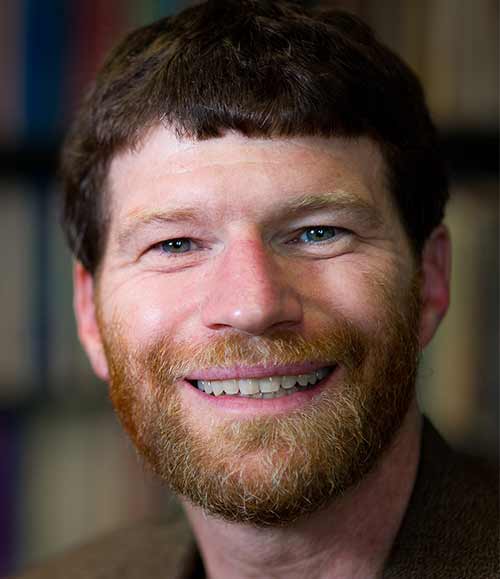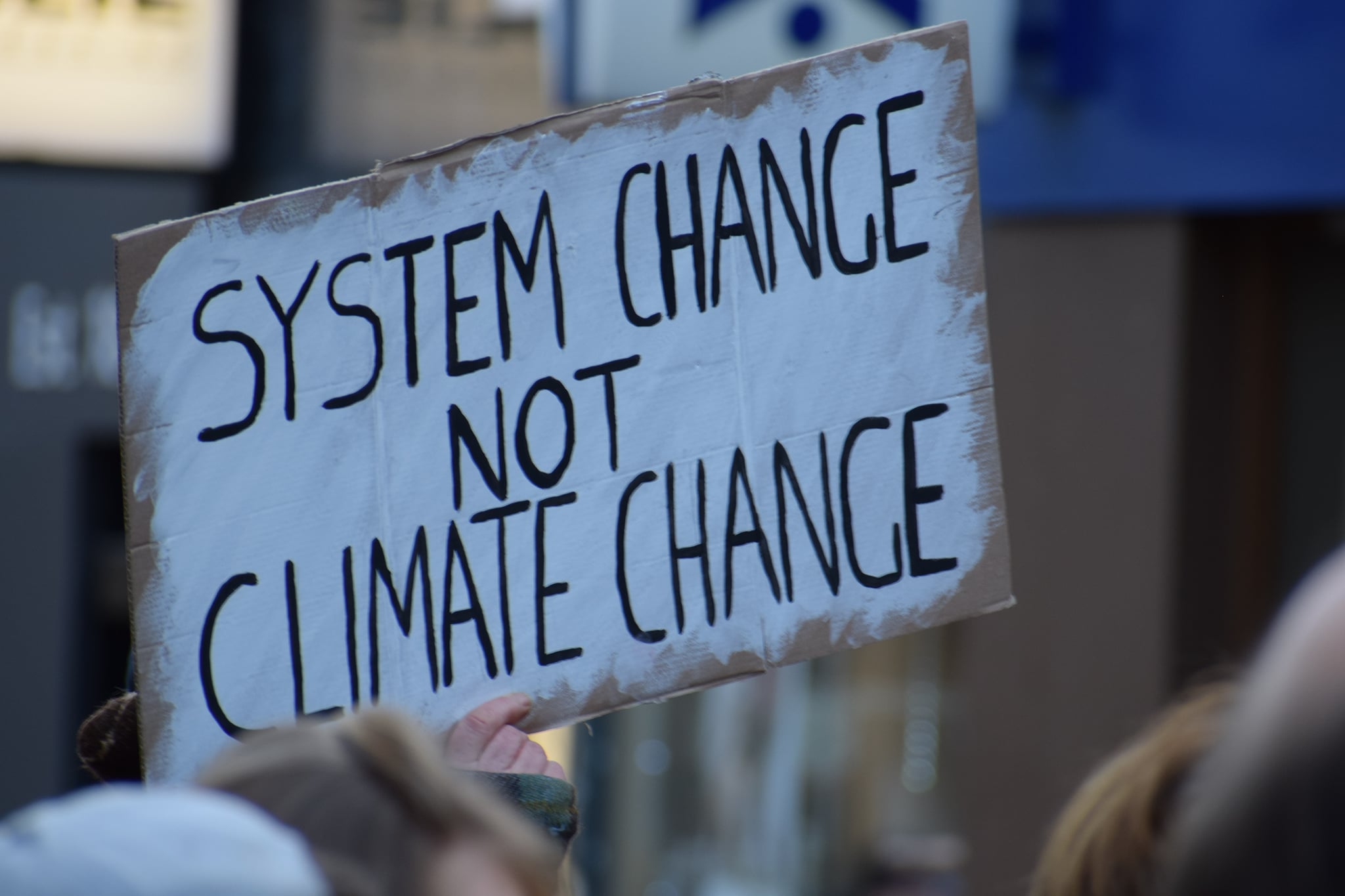Contradictions Between Pledges, Declarations, and Action at COP26
December 3, 2021 - Stephen Gasteyer
Dr. Stephen Gasteyer, Professor of Sociology, has published "Contradictions Between Pledges, Declarations, and Action at COP26" in the Health and Human Rights Journal. The text of the Viewpoint piece is below. The original article can be found at https://www.hhrjournal.org/2021/12/contradictions-between-pledges-declarations-and-action-at-cop26/?fbclid=IwAR0BbxmMBFM1Bi59Veqv0fqDGa_msSfvVZX-a9PJJ-4zvAJmFYPmxxdvszk
 World leaders and diplomats who gathered in Glasgow made pledges (often commitments to make future commitments) that demonstrated incremental progress in mitigating climate change, while mollifying powerful economic and political interests.[1] The problem will be in the implementation of commitments—especially the commitments that will necessitate reigning in powerful actors, rather than simply implementing new technologies that emit less carbon.[2] By the end of the COP26 Summit in Glasgow, the community of nations had at least signed off on pledges to take action and commit resources to limiting global warming. As diplomats from around the world hammered out an agreement that fell short of expectations and was disappointing to many, young people from around the world filled the streets, calling, among other things, on governments not only to pledge but to act to mitigate the effects of climate change.
World leaders and diplomats who gathered in Glasgow made pledges (often commitments to make future commitments) that demonstrated incremental progress in mitigating climate change, while mollifying powerful economic and political interests.[1] The problem will be in the implementation of commitments—especially the commitments that will necessitate reigning in powerful actors, rather than simply implementing new technologies that emit less carbon.[2] By the end of the COP26 Summit in Glasgow, the community of nations had at least signed off on pledges to take action and commit resources to limiting global warming. As diplomats from around the world hammered out an agreement that fell short of expectations and was disappointing to many, young people from around the world filled the streets, calling, among other things, on governments not only to pledge but to act to mitigate the effects of climate change.
For advocates of the world’s most marginalized, climate change is both caused by, and an exacerbating effect of, a mode of development implemented through imperial European capitalism. Indigenous activists gathered across the River Clyde from COP26, declaring the meeting to be indicative of the economic, environmental, and physical violence that they associate with this economic system. Mixteca activist Ita Mendoza from Oaxaca, Mexico, asserted:
The COP is a big business, a continuation of colonialism where people come not to listen to us, but to make money from our land and natural resources.[3]
Scholars have associated corporate and imperial capitalism with extraction and export of resources, the transformation of colonized places, and the displacement of non-European people. It is a form of development that sociologist Jule s Bacon refers to as transformation of the “eco-social structure” through “colonial ecological violence.”[4] Raj Patel and Jason Moore have observed that this form of development is rooted in a pattern of economic development that has always necessitated expansion to the next frontier where land, labour, energy, nature, and lives could be cheapened to provide the resources to prop up accumulation of wealth.[5] The crisis for this development system is that there are few such unexplored frontiers left.
s Bacon refers to as transformation of the “eco-social structure” through “colonial ecological violence.”[4] Raj Patel and Jason Moore have observed that this form of development is rooted in a pattern of economic development that has always necessitated expansion to the next frontier where land, labour, energy, nature, and lives could be cheapened to provide the resources to prop up accumulation of wealth.[5] The crisis for this development system is that there are few such unexplored frontiers left.
These perspectives help us, then, to understand the problem of addressing climate change through technological shifts. The development of new forms of energy that substitute for old forms, while maintaining the same eco-social structure are likely to commit similar ecological violence. An example is Alexander Dunlap’s case study of the negative ecological and social impacts of wind energy in the Tehuantepec region of Oaxaca, Mexico, where multinational corporate investors followed similar processes of resource development and extraction to other extractive industries. The results have been devastated communities and ecologies including the disruption of indigenous subsistence lifestyles through increased traffic of workers, equipment, and the turbines themselves which impact biodiversity and bird flight patterns from land clearing, installation, and operation. The community has limited control over operations and profits from energy generation are captured by the implementing corporation, even as this development is trumpeted for mitigating climate change.[6]
For marginalized people, the resolutions by the United Nations Human Rights Council in October 2021 creating the mandate for a Special Rapporteur on promotion and protection of human rights in the context of climate change and recognizing “the human right to a safe, clean, healthy and sustainable environment” provide important language for articulating human rights claims.[7] The quest for climate mitigation must not lead to the denial of rights for those who seek to protect and remain in sacred and sovereign territory, regardless of the claimed benefits from extraction of resources.
These resolutions are further necessary as powerful corporate and other actors have increased attempts to grab land and resources, repeating patterns of colonial expulsion and extraction. Indeed, their aggressiveness has increased in the face of increased global and indigenous activism.[8] The loftiness of declarations on goals for climate mitigation allowed national representatives to greenwash ongoing acts of eco-social colonial violence against indigenous people and their land. Two examples below exemplify the disconnect between the techno-optimistic rhetoric of governments at COP26 concurrent with their on the ground attempts to seize or destroy land and resources.
The focus on technology can also be a strategy to focus attention away from the connection between violation of human rights and climate justice through ongoing policies of expulsion and extraction. For instance, Israel’s 120-person delegation to COP26 worked on issues including renewable energy, methane emissions, and transportation, with Israel’s Prime Minister Naftali Bennett using the podium to declare that “Israel’s real contribution to the war on climate change will come from technology development. In a press briefing just before that, he said he would set up a fund to encourage investment in climate tech,” according to the Times of Israel.[9] While Israel’s delegation was drawing attention to Israeli technologies that would mitigate climate change, Israel continued the eco-social violence associated with the efforts to capture land and resources, expelling indigenous Palestinians. According to the blog, “Water Justice in Palestine”, in the last month,
settlers and soldiers have destroyed olive trees and a well near Nablus and poisoned olive saplings in Battir, a UNESCO Heritage Site near Bethlehem. On Nov. 12, the army uprooted dozens of trees in Beit Ummar. [10]
These incidents are not isolated, but rather indicative of a pattern. According to Amira Haas, a West Bank reporter for the Israeli newspaper, Haaretz, Israeli settlers occupying four outposts, backed by the Israeli army, have used “systematic violence and terror” over the last five years to seize 4,700 acres of Palestinian land often destroying olive groves with centuries old trees in the process. Haas argues this demonstrates “how the occupation harms not only the Palestinians, but the planet too.”[11]
Likewise, Canada trumpeted its “ambitious emissions reductions target” at COP26 even as it has backed major pipeline initiatives to transport tar sands and other oil despite objections of Indigenous communities in both Canada and the United States.[12] While Prime Minister Justin Trudeau has tried to justify the development of new pipelines on the grounds of safety in transport, the actions of the Canadian government, including the initial reaction in using the Royal Canadian Mounted Police to disband the Wet’suwet’en nonviolent resistance to a pipeline across their sovereign territory, has drawn the ire of many activists.[13] The continuing development of oil and gas pipelines by corporations supported by the Canadian government, crossing First Nation land demonstrates the lack of commitment to action on climate change that would fundamentally change not only the reliance on fossil fuels, but on a system of accumulation dependent on violation of ecological integrity and Indigenous sovereignty. It is seen by some Native activists as an indication that the Canadian government is still rooted in the socio-economic system that inflicts colonial eco-social violence.[14]
These are but two examples. The Human Rights Council resolutions remind us of the problem with the narrow focus on technological solutions to climate change rather than on changing the behavior of the wealthy. We have come to this planetary climate crisis not only because we used the wrong technology, but because of a violent system of accumulation by dispossession of Indigenous peoples. Climate justice means changing that system.
Stephen Gasteyer is an associate professor of sociology at Michigan State University who works on human rights, community development, and the environment, including Indigenous resistance to settler colonial land and resource grabs.
References
[1] A. Hill and M. Babin. 2021. In Brief: What COP26 Did and Didn’t Accomplish. Council on Foreign Relations. https://www.cfr.org/in-brief/cop26-climate-outcomes-successes-failures-glasgow?gclid=Cj0KCQiAkZKNBhDiARIsAPsk0WiZFxMjykyunXPzhwNHzvD-3f-FPzBsZjnwY_btEdKcB6lY2wVPa7MaAknAEALw_wcB, accessed November 29, 2021.
[2] D. McLaren and N. Markusson. The co-evolution of technological promises, modelling, policies and climate change targets. Nature Climate Change, 2020; DOI: 10.1038/s41558-020-0740-1
[3] A quote by Mixteca activist from Oaxaca, Mexico, Ita Mendoza, quoted in, Lakhani, Nina. (2021). “‘A continuation of colonialism’: indigenous activists say their voices are missing at Cop26” The Guardian, Nov. 3, 2021, https://www.theguardian.com/environment/2021/nov/02/cop26-indigenous-activists-climate-crisis, accessed November 30, 2021.
[4] J.M. Bacon (2019) Settler colonialism as eco-social structure and the production of colonial ecological violence, Environmental Sociology, 5:1, 59-69, DOI: 10.1080/23251042.2018.1474725
[5] R. Patel and J. W. Moore, (2017). A history of the world in seven cheap things: A guide to capitalism, nature, and the future of the planet. Oakland: University of California Press
[6] A. Dunlap (2018) The ‘solution’ is now the ‘problem:’ wind energy, colonisation and the ‘genocide-ecocide nexus’ in the Isthmus of Tehuantepec, Oaxaca, The International Journal of Human Rights, 22:4, 550-573, DOI: 10.1080/13642987.2017.1397633
[7] Human Rights Council, The Human Right to a Safe, Clean, Healthy and Sustainable Environment, UN Doc. A/
HRC/48/L.23/Rev.1 (2021); Human Rights Council, Mandate of the Special Rapporteur on the Promotion and Protection
of Human Rights in the Context of Climate Change, UN Doc. A/HRC/48/L.27 (2021).
[8] See, for instance, Global Witness. (2020). Annual report 2020: time for a climate revolution. https://www.globalwitness.org/en/about-us/annual-report-2020-time-climate-revolution/, accessed November 29, 2021.
[9] S. Surkes, (2021). With 40,000 delegates, COP26 radiates energy. But will it bring real change? The Times of Israel 9 November 2021, https://www.timesofisrael.com/with-40000-delegates-cop26-radiates-energy-but-will-it-bring-real-change/, accessed November 29, 2021.
[10] Alliance for Water Justice in Palestine. 2021. Bi-Weekly Brief for November 15, 2021. https://www.waterjusticeinpalestine.org/blog/2021/11/14/bi-weekly-brief-for-november-15, accessed November 29, 2021.
[11] A. Haas, 2021. In Five Years, Four New Settler Farms Took Palestinian Land the Size of a Big Town. Haaretz Nov. 14, 2021, https://www.haaretz.com/israel-news/.premium.HIGHLIGHT-in-5-years-4-new-settler-farms-took-palestinian-land-the-size-of-a-town-1.10382008?utm_source=mailchimp&utm_medium=content&utm_campaign=daily-brief&utm_content=05f2a86eee, November 30, 2021.
[12] Government of Canada. 2021. UN conference on climate action: COP26 in Glasgow, https://www.canada.ca/en/services/environment/weather/climatechange/canada-international-action/un-climate-change-conference/cop26-summit.html, accessed November 29, 2021; Tasker, John Paul. (2016). Trudeau cabinet approves Trans Mountain, Line 3 pipelines, rejects Northern Gateway. CBC News, Nov. 29, 2016, https://www.cbc.ca/news/politics/federal-cabinet-trudeau-pipeline-decisions-1.3872828, November 29, 2021.
[13] J. Kestler-D’Amours, 2021. Understanding the Wet’suwet’en struggle in Canada. Al Jazeera, 1 Mar. 2020, https://www.aljazeera.com/news/2020/3/1/understanding-the-wetsuweten-struggle-in-canada accessed November 29, 2021.
[14] J. Firempong. (2020). We need to talk about colonial violence, Wet’suwet’en and Prime Minister Trudeau. Greenpeace Canada, https://www.greenpeace.org/canada/en/story/29468/we-need-to-talk-about-colonial-violence-wetsuweten-and-prime-minister-trudeau/, accessed November 30, 2021

